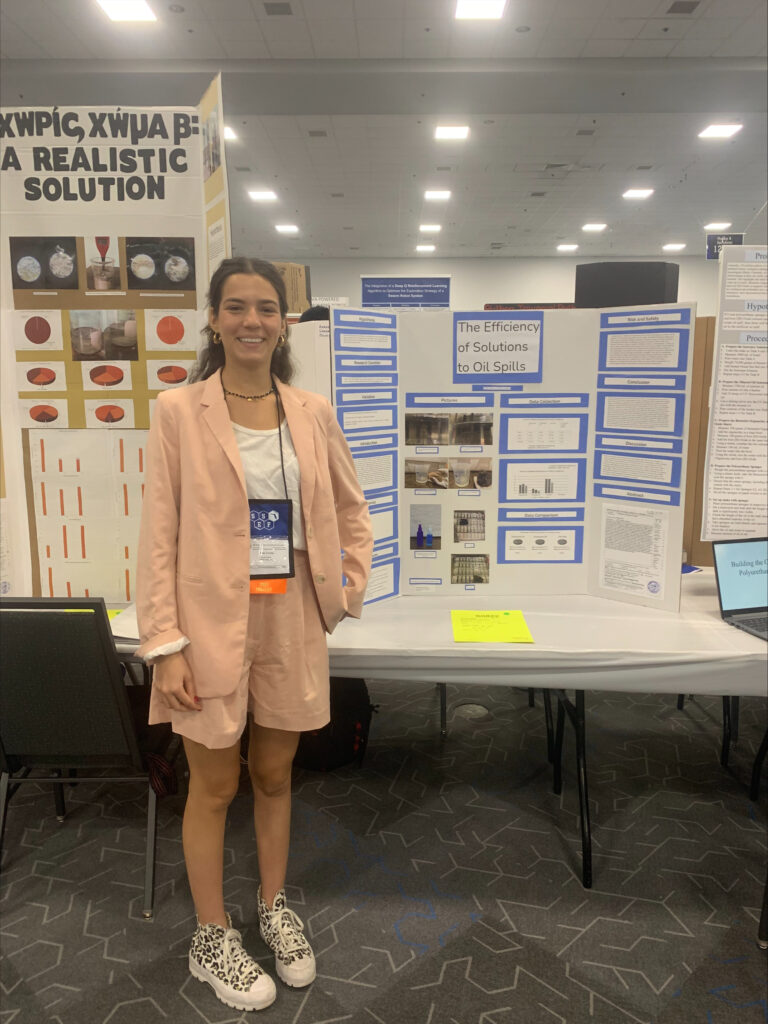
Maite Civetta presenting her research “The Efficiency of Solutions to Oil Spills” at the 2023 State Science and Engineering Fair. Photo by Maite Civetta.
Each year, Florida Sea Grant awards the Chuck Skoch Scholarship to an outstanding high school senior competing in the State Science and Engineering Fair of Florida. The scholarship recognizes promising young researchers in a coastal or marine science-related field.
This year’s scholarship is awarded to Maite Civetta, a senior in the Cambridge Assessment International Education (AICE) program at the Maritime and Science Technology Academy in Miami, Florida.
For her award-winning project, entitled “The Efficiency of Solutions to Oil Spills”, Civetta investigated the most effective and efficient way of removing gasoline from partially enclosed coastal bodies of water that are often exposed to a high level of toxic boating run-off.
She tested three cleaning techniques including a hair mat and two dispersants; Dispersant #1 was a combination of Sprite and vinegar and Dispersant #2 was water mixed with Dawn dish soap.
“Dispersants do a really good job at breaking down oil into smaller droplets in the water column, while hair is porous and likely to absorb gasoline,” says Civetta.
Civetta’s experiment was inspired by her early boating experiences.
“Growing up in Miami, my family owned a boat and we spent a lot of time in the marinas. Whenever I looked in the water, fuel overflowed from fuel nozzles without an automatic cutoff, and this was the reason my mother would not let her swim in areas near boat fuel docks,” says Civetta. “Therefore, the intent of my experiment is to open doors for more interest in the miniature oil spills and increase awareness around marinas.”
To conduct her study, four testing chambers were set up and labeled with 2 quarts of saltwater from the ocean and ⅓ cup of gasoline poured into each. The dispersants were applied and left for a total of two days. Civetta collected the data by counting the clumps of gasoline dispersed in the containers of Dispersant #1 and #2, estimating the size and number of clumps in milliliters, and squeezing the gasoline out of the hair mat which was also measured in milliliters.
Civetta found the hair mat to be the most efficient solution because it removed the most amount of gasoline from the surface of the water and maintained the water quality.
“Sometimes when we are creating solutions to problems, we unintentionally add to the problems. Even if some hair does escape, you’re not leeching any chemicals into the water or adding any plastics. So that’s why I am also measuring the efficiency of solutions.”
Civetta’s research caught the attention of judges due to the relevancy of spilled gasoline in our marinas.
“I was drawn to Maite’s early realization that gasoline (or diesel) can easily overflow into coastal waters when boats are being fueled,” says Dr. Maia McGuire, associate director of education and extension for Florida Sea Grant. “I don’t recall ever having seen a project that tested removal methods for gasoline—typically these projects test oil, which is much more viscous. But her choosing this project made a lot of sense, given that people are fueling boats every day, all around the state.”
Civetta plans to attend the University of Florida this fall and pursue a bachelor’s degree in environmental engineering and hopes to expand her research on oil spills to investigate what types of hair absorb the most gasoline. Civetta intends to pursue an interdisciplinary environmental career that combines her passions for social and natural sciences.
Funding for the scholarship is provided by the Skoch family of Boynton Beach, in memory of Charles “Chuck” Skoch, an avid fisherman, boat captain, and Florida resident.